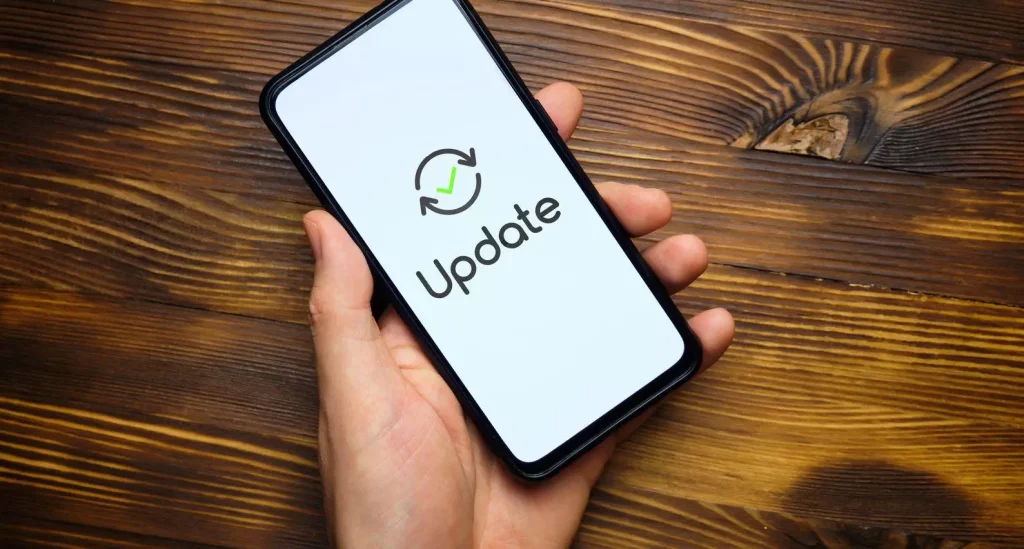In today’s rapidly evolving digital landscape, staying on top of timely software upgrades for mobile devices is more crucial than ever. The escalating cyber threats underscore the significance of not overlooking a single update, as it could expose individuals and organizations to devastating attacks. Neglecting these essential updates can lead to severe consequences, including compromised sensitive data and substantial financial losses. It’s vital to grasp the critical role that software updates play in safeguarding the integrity of our mobile devices. But what are the risks associated with outdated software, and how do regular updates help mitigate these threats?
Key Takeaways
- Timely software upgrades prevent cyber threats by patching security vulnerabilities and fixing bugs, ensuring a secure user experience.
- Neglecting updates exposes mobile devices to weaknesses, compromising user security and sensitive information, and risking financial losses.
- Regular updates safeguard sensitive information, maintain user trust, and enhance mobile device security, protecting against malware and ransomware attacks.
- Outdated software creates vulnerabilities, making mobile devices susceptible to hacking, phishing, and ransomware attacks, which can lead to data breaches.
- Staying up-to-date with software upgrades is critical to preventing security breaches, protecting user data, and maintaining the integrity of sensitive information.
Cybersecurity Risks of Outdated Software
What occurs when mobile devices are left to operate with outdated software, leaving them susceptible to cyber threats? This negligence creates vulnerabilities that hackers exploit, compromising sensitive data and privacy. Outdated software lacks crucial security patches, making devices vulnerable to malware, phishing, and ransomware attacks, ultimately jeopardizing the importance of timely software upgrades for mobile devices.
Importance of Timely Software Upgrades
Implementing timely software upgrades is essential to prevent cyber threats, as outdated software leaves mobile devices vulnerable to attacks, emphasizing the importance of timely software upgrades for mobile devices. Regular updates patch security vulnerabilities, fix bugs, and improve performance, ensuring a secure and seamless user experience. By staying up-to-date, mobile devices remain protected from potential threats, safeguarding sensitive information and maintaining user trust.
Mobile Device Vulnerabilities Exposed
Mobile devices that fail to receive timely software upgrades become susceptible to a multitude of weaknesses, exposing sensitive information and compromising user security. Neglecting updates leaves devices open to exploits, allowing hackers to access private data. This vulnerability is particularly concerning for individuals and organizations relying on mobile devices for daily operations, emphasizing the importance of timely software upgrades for mobile devices.
Consequences of Neglecting Updates
Neglecting software updates can lead to a cascade of repercussions, including compromised data, financial losses, and reputational harm, emphasizing the importance of timely software upgrades for mobile devices. Failure to update mobile devices can result in security breaches, identity theft, and system crashes, ultimately compromising the integrity of sensitive information and undermining user trust.
Frequently Asked Questions
What Happens if I Don’t Update My Mobile Device’s Operating System?
Failing to update your mobile device’s operating system can lead to crucial security vulnerabilities, exposing your personal data to cyber threats, and compromising overall device performance and functionality.
How Often Should I Update My Mobile Device’s Software?
To guarantee peak device performance and security, it is recommended to update your mobile device’s software as soon as new updates become available, ideally every 1-2 months, or as prompted by the device’s operating system.
Can Software Updates Affect My Mobile Device’s Performance?
Software updates can certainly impact mobile device performance, potentially enhancing speed, resolving bugs, and improving overall functionality, but may additionally temporarily slow down the device during the update process.
Do Software Updates Erase Data on My Mobile Device?
No, software updates typically do not erase data on your mobile device, as they primarily focus on installing security patches, bug fixes, and feature improvements, leaving your personal data intact and unaffected.
Are All Software Updates Mandatory for Mobile Devices?
Not all software updates are required for mobile devices, but ignoring them can leave devices vulnerable to security risks, compatibility issues, and performance degradation, making timely updates crucial for peak device functionality.
Conclusion
In summary, the importance of timely software upgrades for mobile devices cannot be overstated. Failure to implement these updates exposes devices to cyber threats, compromising sensitive information and risking financial losses. By prioritizing regular updates, users can safeguard against vulnerabilities, improve performance, and maintain the integrity of their devices. It is imperative that individuals and organizations recognize the critical role of software upgrades in mitigating cyber risks and protecting against potential attacks.
Also read: Cloud Services Are Changing the Landscape of IT Management

